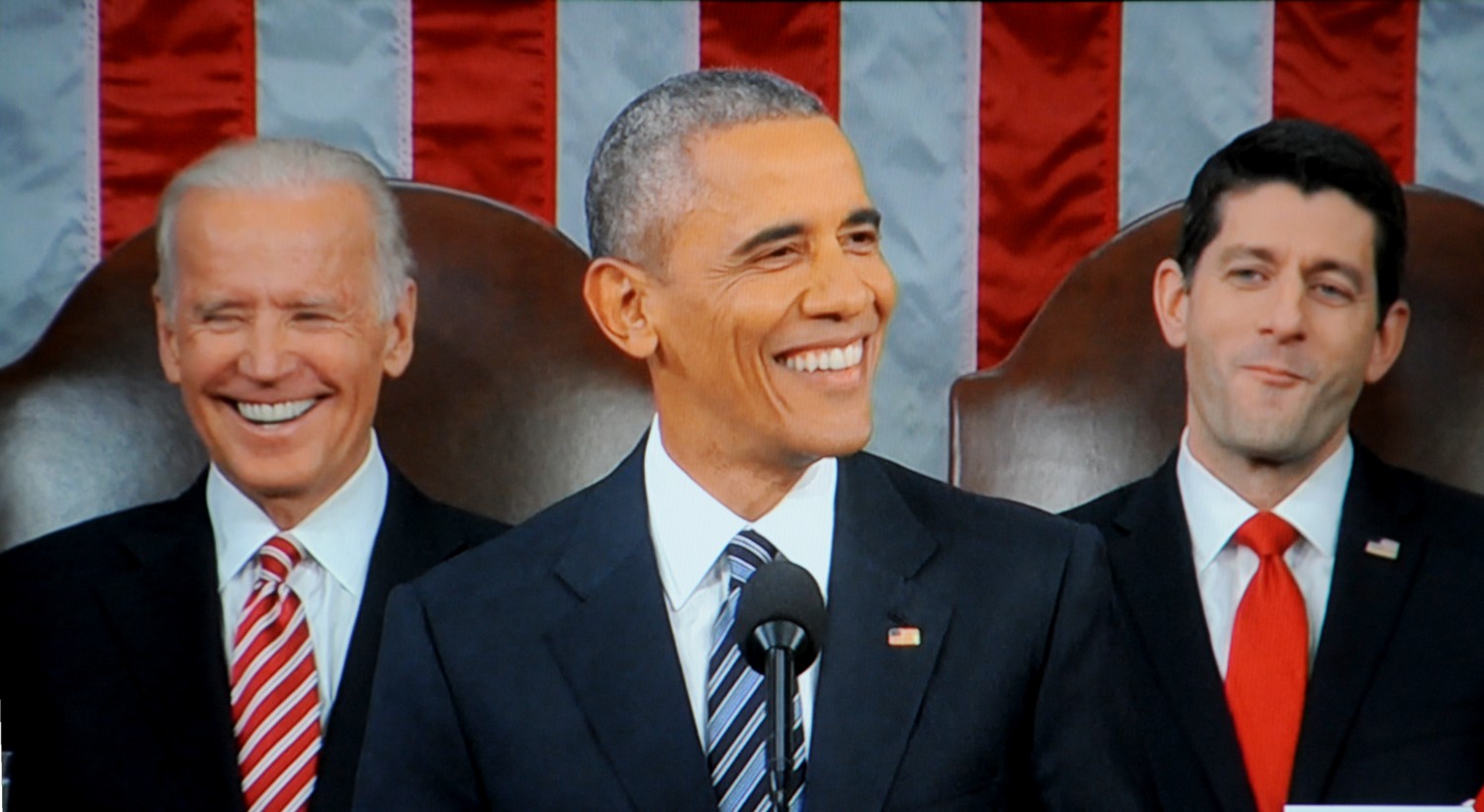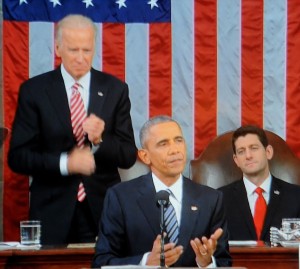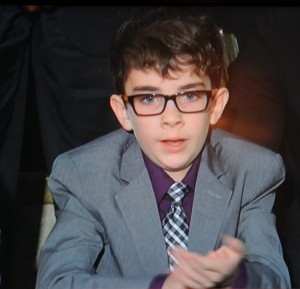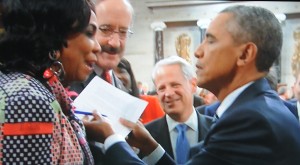
by Karen Rubin/news-photos-features.com
President Barack Obama’s final State of the Union Address evoked the Obama of 2008 and 2009 – eager, enthusiastic, passionate. The themes were echoes of all his major speeches – evoking the values that make America great, the vision of what American could be, and the path we can take to toward that “more perfect union.”
“Progress is not inevitable,” he said. “It’s the result of choices we make together. And we face such choices right now. Will we respond to the changes of our time with fear, turning inward as a nation, turning against each other as a people? Or will we face the future with confidence in who we are, in what we stand for, in the incredible things that we can do together?”
And again, he said, “The future we want — all of us want — opportunity and security for our families, a rising standard of living, a sustainable, peaceful planet for our kids — all that is within our reach. But it will only happen if we work together. It will only happen if we can have rational, constructive debates. It will only happen if we fix our politics.”
Instead of focusing on the past, he looked to the future, clear-eyed and realistic, armed with the experience of seven years as President and Commander-in-Chief, and listed “four big questions that I believe we as a country have to answer — regardless of who the next President is, or who controls the next Congress:
“First, how do we give everyone a fair shot at opportunity and security in this new economy?
“Second, how do we make technology work for us, and not against us — especially when it comes to solving urgent challenges like climate change?
“Third, how do we keep America safe and lead the world without becoming its policeman?
“And finally, how can we make our politics reflect what’s best in us, and not what’s worst?”
He began so matter-of-factly, listing the transformational accomplishments of his administration tripping off the tongue – rescuing the economy from the brink of collapse, record increases in private sector jobs creation (more than 14 million new jobs), cutting the unemployment rate in half, reducing the federal deficit by 70%, raising the percentage of Americans with health care to record levels, raising America’s standing in the world and leading on an unprecedented Climate Agreement signed by 196 nations. But he ended with a fascinating admission of regret and his own failing at the corrosive partisanship, a warning of threat to the body politic and a call to action by the American people to rescue their democracy before it is too late.
“Our public life withers when only the most extreme voices get all the attention. And most of all, democracy breaks down when the average person feels their voice doesn’t matter; that the system is rigged in favor of the rich or the powerful or some special interest.
“Too many Americans feel that way right now,” he said, confessing “It’s one of the few regrets of my presidency — that the rancor and suspicion between the parties has gotten worse instead of better. I have no doubt a president with the gifts of Lincoln or Roosevelt might have better bridged the divide, and I guarantee I’ll keep trying to be better so long as I hold this office.”
In fact, throughout his presidency, he has reached out, pleaded for the “good ideas” that Republicans might want to offer instead of just tearing down – immigration reform, health care (that’s why it took 18 months), gun safety, climate action. The list goes on and on and on.
“But, my fellow Americans, this cannot be my task — or any President’s — alone. There are a whole lot of folks in this chamber, good people who would like to see more cooperation, would like to see a more elevated debate in Washington, but feel trapped by the imperatives of getting elected, by the noise coming out of your base. I know; you’ve told me. It’s the worst-kept secret in Washington. And a lot of you aren’t enjoying being trapped in that kind of rancor.”

But the signs weren’t good, because throughout his speech, with the exception of a shout-out to the troops and when he said, “I think outdated regulations that need to be changed,” the Republicans and House Speaker Paul Ryan sat steely throughout the speech, looking angry and disagreeable.
Looking passed the Senators, Congressmen, Supreme Court Justices, cabinet members, military leaders that filled the Capitol, straight to the American people, he warned of the corruption of the political process, swallowed by rich donors and well-funded special interests, policies that make it harder, not easier to vote, and a system of gerrymandering where politicians get to select their voters, rather than voters selected their elected officials.
“But that means if we want a better politics — and I’m addressing the American people now — if we want a better politics, it’s not enough just to change a congressman or change a senator or even change a President. We have to change the system to reflect our better selves. I think we’ve got to end the practice of drawing our congressional districts so that politicians can pick their voters, and not the other way around. (Applause.) Let a bipartisan group do it. (Applause.)
“We have to reduce the influence of money in our politics, so that a handful of families or hidden interests can’t bankroll our elections. (Applause.) And if our existing approach to campaign finance reform can’t pass muster in the courts, we need to work together to find a real solution — because it’s a problem. And most of you don’t like raising money. I know; I’ve done it. (Applause.) We’ve got to make it easier to vote, not harder. (Applause.) We need to modernize it for the way we live now. (Applause.) This is America: We want to make it easier for people to participate. And over the course of this year, I intend to travel the country to push for reforms that do just that.
“But I can’t do these things on my own. (Applause.) Changes in our political process — in not just who gets elected, but how they get elected — that will only happen when the American people demand it. It depends on you. That’s what’s meant by a government of, by, and for the people.”
Evoking President Dwight Eisenhower’s warning of the impending threat of the military-industrial complex to democracy, Obama said:
“What I’m suggesting is hard. It’s a lot easier to be cynical; to accept that change is not possible, and politics is hopeless, and the problem is all the folks who are elected don’t care, and to believe that our voices and actions don’t matter. But if we give up now, then we forsake a better future. Those with money and power will gain greater control over the decisions that could send a young soldier to war, or allow another economic disaster, or roll back the equal rights and voting rights that generations of Americans have fought, even died, to secure. And then, as frustration grows, there will be voices urging us to fall back into our respective tribes, to scapegoat fellow citizens who don’t look like us, or pray like us, or vote like we do, or share the same background.
“We can’t afford to go down that path. It won’t deliver the economy we want. It will not produce the security we want. But most of all, it contradicts everything that makes us the envy of the world.

“So, my fellow Americans, whatever you may believe, whether you prefer one party or no party, whether you supported my agenda or fought as hard as you could against it — our collective futures depends on your willingness to uphold your duties as a citizen. To vote. To speak out. To stand up for others, especially the weak, especially the vulnerable, knowing that each of us is only here because somebody, somewhere, stood up for us. (Applause.) We need every American to stay active in our public life — and not just during election time — so that our public life reflects the goodness and the decency that I see in the American people every single day.”
Obama began the speech veritably skipping over the big legislative items that remain to be done, that a President would normally lay out for Congress in the State of the Union, but showed his recognition that a Republican Congress that has obstructed for seven years is unlikely to undertake anything significant in the mere 80 days the Republicans have scheduled to be in session during this election year. Still, they tripped over the tongue: immigration reform, criminal justice, gun safety, finally shuttering Guantanamo prison as he has tried to do since his first day in office. He held out some hope that the Republicans might support criminal justice reform and the Trans Pacific Partnership because these align with the Republicans’ corporate sponsors’ agenda and got big applause from the right when he said there are regulations that are outdated.
But then he came back with, “But after years now of record corporate profits, working families won’t get more opportunity or bigger paychecks just by letting big banks or big oil or hedge funds make their own rules at everybody else’s expense. Middle-class families are not going to feel more secure because we allowed attacks on collective bargaining to go unanswered. Food Stamp recipients did not cause the financial crisis; recklessness on Wall Street did. (Applause.) Immigrants aren’t the principal reason wages haven’t gone up; those decisions are made in the boardrooms that all too often put quarterly earnings over long-term returns. It’s sure not the average family watching tonight that avoids paying taxes through offshore accounts… in this In new economy, workers and start-ups and small businesses need more of a voice, not less. The rules should work for them.”
Then he proceeded to lay out a clear-eyed, realistic vision of what could happen, what must happen in light of the realities in which we live – framed by economic and social change that is happening whether or not people accept it, and, yes, terrorism.
Making it clear he does not intend to be a lame-duck president, frittering away the last year of his presidency, he listed specific programs that he hopes to see action on – the most significant being a “moonshot”-style initiative to marshal resources and research through the National Institutes of Health to cure cancer, naming Vice President Joe Biden, who lost his son Beau Biden to cancer months ago, to head it.
Similarly, citing the dramatic gains in developing clean, renewable energy, he hinted at a carbon tax to accelerate the transition away from old, dirtier energy sources, and move toward putting a price on carbon. “Rather than subsidize the past, we should invest in the future — especially in communities that rely on fossil fuels.”
He listed a number of education initiatives including: providing Pre-K for all; offering every student the hands-on computer science and math classes “that make them job-ready on day one”; “recruit and support more great teachers for our kids”; make college affordable for every American; provide two years of community college at no cost for every responsible student.
And noting that despite the improvements in the economy, so many Americans feel left behind and fearful of the changes swirling about them, he focused on easing the economic security of the beleaguered middle class, saying “we must strengthen, not weaken Social Security and Medicare.” Also, “make [retirement] benefits portable and protect against losses;” and “promote economic security by offering retraining in the event of job loss and wage insurance.”
Among the issues glossed over, clearly mindful that the Republican-dominated Congress would not act, was reference to gun violence prevention measures or the executive orders he announced in absence of any Congressional action. He simply included “protecting our kids from gun violence” in the list of unfinished items of concern. The camera did not even have time to pan to the empty chair left between First Lady Michelle Obama and Connecticut Governor Daniel P. Malloy, left for the countless thousands victims of gun violence.
“We leave one seat empty in the First Lady’s State of the Union Guest Box for the victims of gun violence who no longer have a voice – because they need the rest of us to speak for them,” the White House stated prior to the address. “To tell their stories. To honor their memory. To support the Americans whose lives have been forever changed by the terrible ripple effect of gun violence – survivors who’ve had to learn to live with a disability, or without the love of their life. To remind every single one of our representatives that it’s their responsibility to do something about this.”
He gave a steely, no-nonsense declaration of America’s military strength and leadership in the world, and its commitment to defend Americans and prosecute terrorists.
“No nation attacks us directly, or our allies, because they know that’s the path to ruin. Surveys show our standing around the world is higher than when I was elected to this office, and when it comes to every important international issue, people of the world do not look to Beijing or Moscow to lead — they call us.
“I know this is a dangerous time. But that’s not primarily because of some looming superpower out there, and certainly not because of diminished American strength. In today’s world, we’re threatened less by evil empires and more by failing states.”
But he affirmed the success of the so-called Obama Doctrine, elevating diplomacy over a shoot-first-and-ask-questions-later strategy, particularly with the Iran nuclear agreement and in opening up Cuba after 50 years of fruitless isolation that did not produce a democratic Cuba, and glossed over the success in leading the way to a historic Climate Action Agreement signed by 196 countries.
And with a clear arrow sent in the direction of Donald Trump and Ted Cruz, and the extreme rhetoric of the Republican presidential candidates, he warned, “But as we focus on destroying ISIL, over-the-top claims that this is World War III just play into their hands. Masses of fighters on the back of pickup trucks, twisted souls plotting in apartments or garages — they pose an enormous danger to civilians; they have to be stopped. But they do not threaten our national existence. That is the story ISIL wants to tell. That’s the kind of propaganda they use to recruit.”
Obama could have crowed more than he did in saying, “With nearly 10,000 air strikes, we’re taking out their leadership, their oil, their training camps, their weapons. We’re training, arming, and supporting forces who are steadily reclaiming territory in Iraq and Syria.” By some reports, ISIL has lost control over 40% of the territory it had held at its peak, but Obama did not mention this.
But he challenged Congress to act instead of criticize: “If this Congress is serious about winning this war, and wants to send a message to our troops and the world, authorize the use of military force against ISIL. Take a vote.”
“The world will look to us to help solve these problems, and our answer needs to be more than tough talk or calls to carpet-bomb civilians. That may work as a TV sound bite, but it doesn’t pass muster on the world stage.”
“The point is American leadership in the 21st century is not a choice between ignoring the rest of the world — except when we kill terrorists — or occupying and rebuilding whatever society is unraveling. Leadership means a wise application of military power, and rallying the world behind causes that are right. It means seeing our foreign assistance as a part of our national security, not something separate, not charity.”
“When politicians insult Muslims, whether abroad or our fellow citizens, when a mosque is vandalized, or a kid is called names, that doesn’t make us safer. That’s not telling it like it is. It’s just wrong. It diminishes us in the eyes of the world. It makes it harder to achieve our goals. It betrays who we are as a country.”

Obama’s State of the Union message, ending with the riveting phrase so well placed at the end – resounded like the Obama of 2008 and 2009 – the themes and tones of unity and his confidence in the spirit of the American people and the values that underlie this nation still dominant, his passion, energy and enthusiasm for his role as President and Commander-in-Chief roaring to the surface. But instead of being overtaken by cynicism under the unprecedented personal attacks and disrespect he has been shown since the very first State of the Union address in 2009, Obama seemed incredibly relaxed and comfortable in his own skin, still filled with optimism, excitement, if sharpened by his experience:
He described America’s spirit of discovery, innovation and entrepreneurship, its diversity and cherished freedom.
“That’s the America I know. That’s the country we love. Clear-eyed. Big-hearted. Undaunted by challenge. Optimistic that unarmed truth and unconditional love will have the final word. (Applause.) That’s what makes me so hopeful about our future. I believe in change because I believe in you, the American people.
“And that’s why I stand here confident as I have ever been that the State of our Union is strong.”
See the speech, highlighted.
See also: See Who Will Be Guests in First Lady’s Box for Obama’s Final State of the Union Address
_____________________________
© 2015 News & Photo Features Syndicate, a division of Workstyles, Inc. All rights reserved. For editorial feature and photo information, go towww.news-photos-features.com,
